✒️Intellectual Traditions
This note will examine the objectives and impacts of the following intellectual traditions:
- African Caribbean thought: Pan Africanism; negritude; Rastafari;
- Economic and political thought: industrialization by invitation; Marxism; dependency theory;
- Caribbean feminist thought and theories of gender;
- Indo-Caribbean thought;
- Indigenous perspectives.
But perhaps it would first be wise to examine the factors or the environment that facilitated the rise of these intellectual traditions.
The Environment
- injustices stemming from slavery.
- the ensuing racial and social inequality that arose from post-emancipation colonial structures.
- persistent Caribbean underdevelopment.
Afro-Caribbean Thought
Afro-Caribbean philosophy represents an interdisciplinary space, where a variety to approaches to thinking are practiced, examined and critiqued. This philosopy challenged Western European epistemology 1Epistemology is essentially the philosophy of knowledge. It delves into fundamental questions about what knowledge is, how we acquire it, and the limitations of what we can know. Epistemologists wrestle with questions like: What differentiates true belief from knowledge?, How can we justify our beliefs? Are there certain ways of knowing that are more reliable than others?This field has been a central topic in philosophy since the time of the ancient Greeks, and it continues to be actively debated today. Some of the big thinkers in epistemology include Plato, René Descartes, and John Locke. Their ideas have had a profound impact on our understanding of the world and ourselves. and ontology. The result is a fresh ground for exchange of ideas that welcomes innovation and discards Western disciplinary philosophical thought as a fundamental requirement to pursuing questions and theoretical ideas about Africans in the Americas.
Gertrude James González de Allen
PAN-AFRICANISM
Overview of Pan-Africanism
- Pan-Africanism is a worldwide movement that aims to encourage and strengthen bonds of solidarity between all indigenous and diaspora ethnic groups of African descent.
- Its origins can be traced back to the late 19th and early 20th centuries, emerging as a response to the historical trials of slavery, colonialism, and racial discrimination that Africans and people of African descent faced globally.
- The objectives and impact of Pan-Africanism have evolved, reflecting the changing socio-political landscapes and the needs of African peoples. Below are some of the key objectives and their impact.
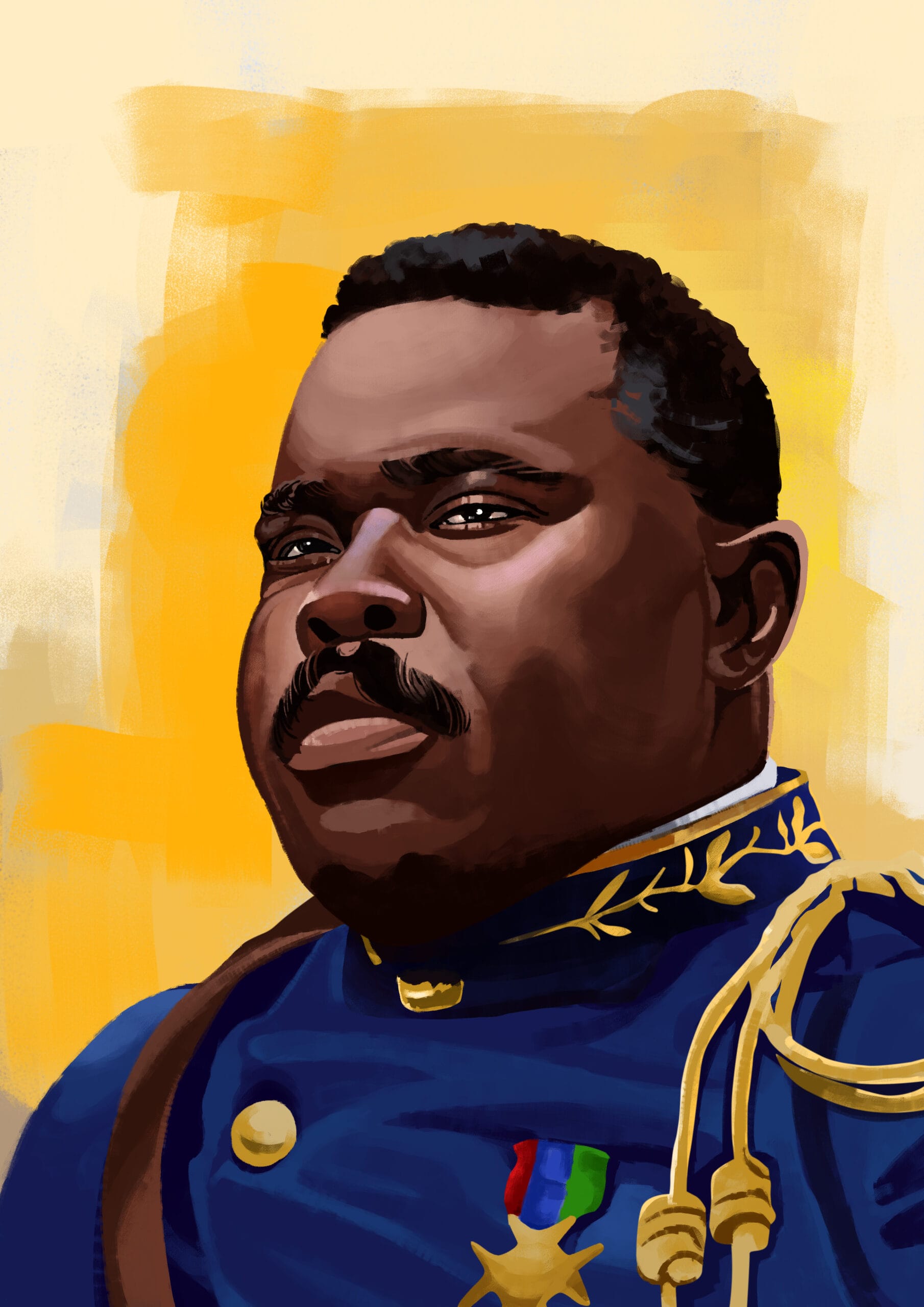
MARCUS MOSIAH GARVEY
1887-1940
Marcus Garvey 2born on August 17, 1887, in St. Ann’s Bay, Jamaica, was a prominent figure in the Black Nationalist and Pan-African movements. He founded the UNIA 3Universal Negro Improvement Association and African Communities League, which aimed to promote African pride and unity, and economic independence. Garvey’s work was driven by his belief in racial separatism and the “back to Africa” movement, which sought to establish a homeland for African Americans in Africa.
In 1919, Garvey established the Black Star Line, a shipping company to facilitate trade and commerce between Africans in America, the Caribbean, and Africa. He also created the Negro Factories Association to manufacture marketable commodities in major industrial centers. Despite facing numerous challenges, including legal troubles and opposition from other Black leaders, Garvey’s influence on Black nationalism and Pan-Africanism remains significant.
Objectives of Pan-Africanism
- Unity and Solidarity: One of the core objectives of Pan-Africanism is to promote unity and solidarity among African nations and peoples of African descent worldwide. The movement aims to foster a sense of shared identity and purpose, transcending geographic and cultural boundaries.
- Self-determination and Independence: Pan-Africanism has historically emphasized the importance of African nations achieving self-determination and independence from colonial rule. The movement supported the struggle for liberation and sovereignty across the African continent.
- Economic Cooperation and Development: Economic empowerment and cooperation among African countries have been significant goals. The movement seeks to encourage economic strategies that are conducive to the continent’s development, leveraging shared resources and knowledge to achieve sustainable growth.
- Cultural Exchange and Preservation: Pan-Africanism advocates for the preservation of African cultures and the promotion of cultural exchange among African peoples. It recognizes the rich diversity of African traditions and seeks to protect them from erasure or dilution.
- Political Mobilization and Advocacy: The movement has been instrumental in mobilizing people of African descent globally towards political activism, advocating for rights, and challenging injustices including racism, discrimination, and inequality.
KWAME NKRUMAH
1909-1972
Kwame Nkrumah, 4born on September 21, 1909, in Nkroful, Gold Coast (now Ghana), was a pioneering figure in the African independence movement and the first prime minister5(1957-1960) and president6(1960-1966) of the Republic of Ghana. He played a pivotal role in leading the Gold Coast’s drive for independence from Britain and was instrumental in the emergence of Ghana as a new nation in 1957.
Nkrumah’s political philosophy was a blend of socialism and Pan-Africanism. He was deeply influenced by the literature of Karl Marx, Vladimir Lenin, and Marcus Garvey, which shaped his vision for Ghana and Africa as a whole. Nkrumah advocated for African unity and was a leading proponent of the United States of Africa, and co-founded the Organization for African Unity.
Under his leadership, Ghana experienced developments in education, healthcare, and infrastructure. However, his government faced challenges. Nkrumah’s increasing authoritarianism and his government’s financial mismanagement led to a coup d’état in 1966 while he was on a peace mission in Vietnam. He spent the rest of his life in exile, first in Guinea and later in Romania, where he died on April 27, 1972.
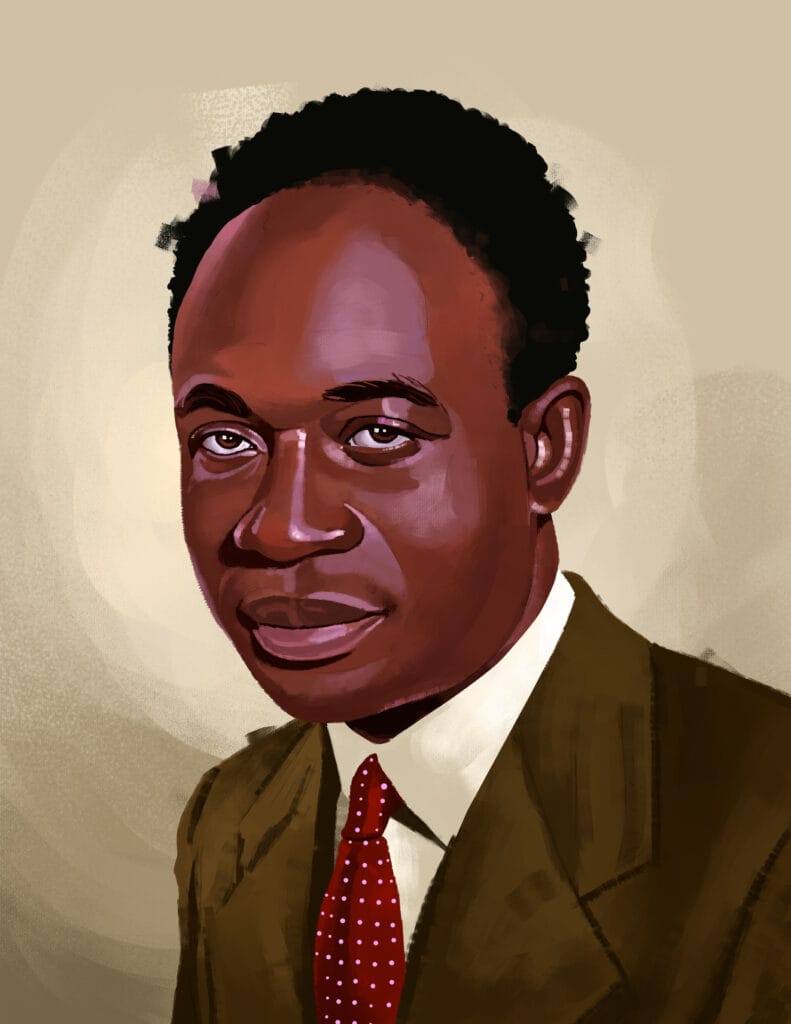
Impact of Pan-Africanism
- Decolonization: Pan-Africanism played a critical role in the decolonization process across Africa. The movement supported anti-colonial efforts, leading to the independence of many African countries in the mid-20th century.
- Strengthening African Identity: It has significantly contributed to the strengthening of African identity and pride among people of African descent, fostering a sense of belonging and community that transcends national boundaries.
- Economic Initiatives: The principles of Pan-Africanism have influenced the establishment of regional economic communities and initiatives aimed at enhancing economic cooperation and integration across the continent, such as the African Union (AU) and the African Continental Free Trade Area (AfCFTA).
- Cultural Renaissance: The movement has inspired a cultural renaissance, promoting the revival and global appreciation of African arts, music, literature, and heritage.
- Political and Social Influence: Pan-Africanism has affected the political landscape by advocating for the rights and representation of people of African descent on global platforms. It has raised awareness about issues facing the African diaspora and influenced policies related to social justice, equity, and inclusion.
Overall, the objectives and impact of Pan-Africanism have been profound, contributing to political, social, and economic advancements for people of African descent. While challenges remain, the movement continues to inspire new generations in the pursuit of unity, freedom, and development for Africa and its diaspora.
NÉGRITUDE
- Négritude is a cultural, philosophical, and literary movement that emerged in the early 20th century, primarily among Francophone African and Caribbean writers and intellectuals.
- The movement was a response to French colonialism and the policy of assimilation7French colonial policy was completely different from that of Great Britain. France had a grand assimilationist colonial policy, the aim of which was to assimilate and transform all Africans in “French” colonies into black French men and women. To accomplish this goal, France had to eliminate all African cultures and assimilate all Africans into French culture. One example of this can be found in examining the French press in French colonies.
The colonial administration was the sole authorized newspaper publisher in most territories. One of the roles of the French colonial press, which was strictly controlled from Paris, was to advance the colonial assimilationist policy through the promotion of the “Frenchification” of Africans. Because this policy favored direct rule from Paris, there was a tax on importation of newsprint and printing machinery into the African colonies but none on the import of newspapers published in France. As a result, the local production of newspapers was penalized, and the circulation of French newspapers was encouraged. The Catholic Church, through France-based Catholic orders, had educational institutions and newspapers in Africa. These were, however, tailor-made to fit the official policy of assimilation., which tried to erase Black cultures and identities.
- Négritude aimed to awaken a collective consciousness among black people about their heritage and to affirm the value of their culture, history, and identity.
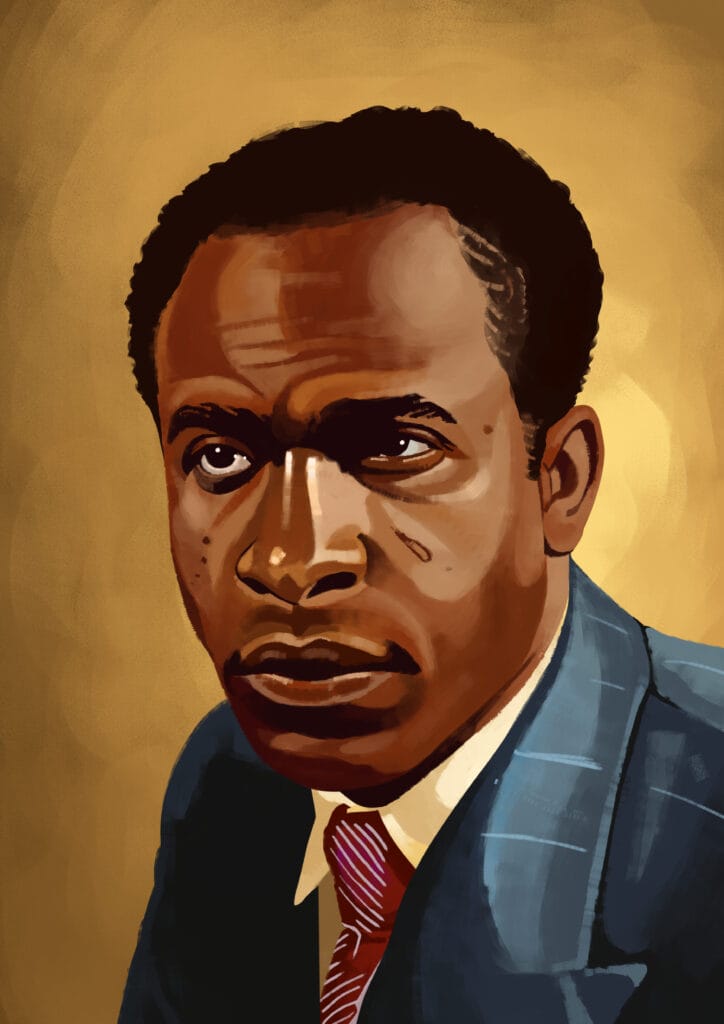
FRANTZ FANON
1925-
Frantz Fanon’s life and work have had a lasting impact on anti-colonial movements and the understanding of the psychological effects of colonialism. Fanon was a psychiatrist, intellectual, and revolutionary who became an influential voice in the fight against colonialism and oppression. His works, such as “Black Skin, White Masks” and “Wretched of the Earth,” explored the psychological and social effects of colonialism on colonized peoples. These works, along with his support for the Algerian War of Independence, have influenced anti-colonial movements across the globe.
Fanon’s experiences with racism and colonialism began early in life. Although he grew up on the largely Black island of Martinique, he had not experienced the full force of white racism until he left the island. This exposure led him to write about racial oppression, culminating in his first book, “Black Skin, White Masks.”
In addition to his intellectual pursuits, Fanon played a significant role in the Algerian War of Independence. As a doctor during this time, he treated both Algerian fighters and French colonial forces, witnessing the brutal tactics used by the colonial forces, including mass violence, rape, and torture.
Objectives of Négritude
- Cultural Affirmation: One of the primary objectives of Négritude was to affirm the value and richness of African cultures and traditions, promoting a positive identity for black people in contrast to the negative stereotypes perpetuated by colonial societies.
- Resistance to Colonialism: The movement sought to resist and critique colonial domination and the racism inherent in colonial ideologies. It was a form of intellectual and cultural resistance against the dehumanization of Africans and people of African descent.
- Solidarity Among Black Peoples: Négritude aimed to foster a sense of solidarity and unity among black people across the world, emphasizing shared experiences of colonial oppression and the struggle for dignity and self-determination.
- Reclamation of African Heritage: Key figures in the Négritude movement advocated for a reconnection with African heritage, encouraging a rediscovery and celebration of African history, languages, arts, and spiritual practices that colonialism had sought to erase or devalue.
- Intellectual and Artistic Expression: The movement provided a platform for black intellectuals, writers, and artists to express their creativity and to contribute to a global dialogue on race, identity, and liberation.
Impact of Négritude
- Cultural Renaissance: Négritude significantly contributed to a cultural renaissance among African and Caribbean communities, leading to a resurgence of interest in African traditions, arts, and literature. It helped to inspire a generation of writers, poets, and artists who explored themes of identity, resistance, and liberation in their work.
- Decolonization Efforts: While primarily a cultural and intellectual movement, Négritude also played a role in the broader decolonization movements across Africa and the Caribbean. It helped to articulate a vision of freedom and autonomy that influenced political movements seeking independence from colonial rule.
- Influence on Later Movements: The ideas and ethos of Négritude influenced later movements that focused on black identity and civil rights, including the Black Power movement in the United States and the Pan-Africanism movement. Its emphasis on black pride and cultural affirmation resonated with many across the African diaspora.
- Academic and Theoretical Contributions: Négritude contributed to the development of postcolonial theory and studies, offering critical perspectives on the impact of colonialism on culture, identity, and society. Its critique of Eurocentric perspectives and valorization of African epistemologies enriched academic discourse.
- Critique and Evolution: While influential, Négritude has also been critiqued for its idealization of Africa, its gender dynamics, and its applicability across diverse African and diasporic contexts. Nevertheless, it opened spaces for the exploration of black identity and the decolonization of thought and culture.
The legacy of Négritude is complex and multifaceted, reflecting its origins in a specific historical and cultural context. Its impact continues to be felt in the ongoing efforts to celebrate black culture, challenge racism, and reassert the value of African and diasporic contributions to global civilization.
RASTAFARIANISM
- Rastafarianism is a religious and social movement that originated in Jamaica in the 1930s, following the coronation of Haile Selassie I as Emperor of Ethiopia in 1930.
- It combines Protestant Christianity, mysticism, and a pan-African political consciousness, and it has had a significant impact on Jamaican culture, music, and identity, as well as a broader influence globally.
- The movement’s development was heavily influenced by the ideas of Marcus Garvey, a Jamaican political leader who advocated for the return of the African diaspora to their ancestral lands.
Objectives of Rastafarianism
- Spiritual and Religious Fulfillment: At its core, Rastafarianism seeks spiritual enlightenment and religious fulfillment through a connection to Haile Selassie I, whom Rastafarians venerate as the reincarnation of Jesus Christ and the living God. This connection is often expressed through Biblical interpretation and spiritual practices.
- African Identity and Heritage: Rastafarianism emphasizes the importance of African heritage and identity among black people. It promotes pride in African culture and history, advocating for a psychological and physical return to Africa, seen as the promised land or Zion.
- Resistance and Liberation: The movement is inherently anti-colonial, challenging the legacies of slavery and racism. It seeks to liberate black people from the oppressive structures of Western society and to reject the Eurocentric worldview.
- Social and Economic Justice: Rastafarians advocate for social and economic justice, opposing materialism and inequality. The movement often emphasizes communal living, cooperation, and the importance of living in harmony with nature.
- Dietary and Lifestyle Practices: Rastafarianism promotes a specific lifestyle that includes the Ital diet (largely vegetarian or vegan), natural living, and the ritualistic use of marijuana, which is considered a sacrament that brings one closer to the divine.
HAILE SELASSIE
1892-1975
Haile Selassie, born on July 23, 1892, near Harer, Ethiopia, and died on August 27, 1975, in Addis Ababa, was the emperor of Ethiopia from 1930 to 1974. He is remembered for his efforts to modernize Ethiopia and steer it into the mainstream of post-World War II African politics. During his reign, Ethiopia joined the League of Nations and the United Nations, and Addis Ababa became the major center for the Organization of African Unity (now African Union).
In addition to his political contributions, Haile Selassie is also a central figure in the Rastafarian movement, which regards him as a divine figure representing African redemption and Pan-Africanism. This belief stems from a speech by Marcus Garvey, a Jamaican-born activist and Pan-Africanist leader, who said, “Look to Africa, when a black king shall be crowned, for the day of deliverance is near.” Garvey’s statement was interpreted by some as referring to Haile Selassie’s coronation, leading to the belief in his divinity within the Rastafarian movement.
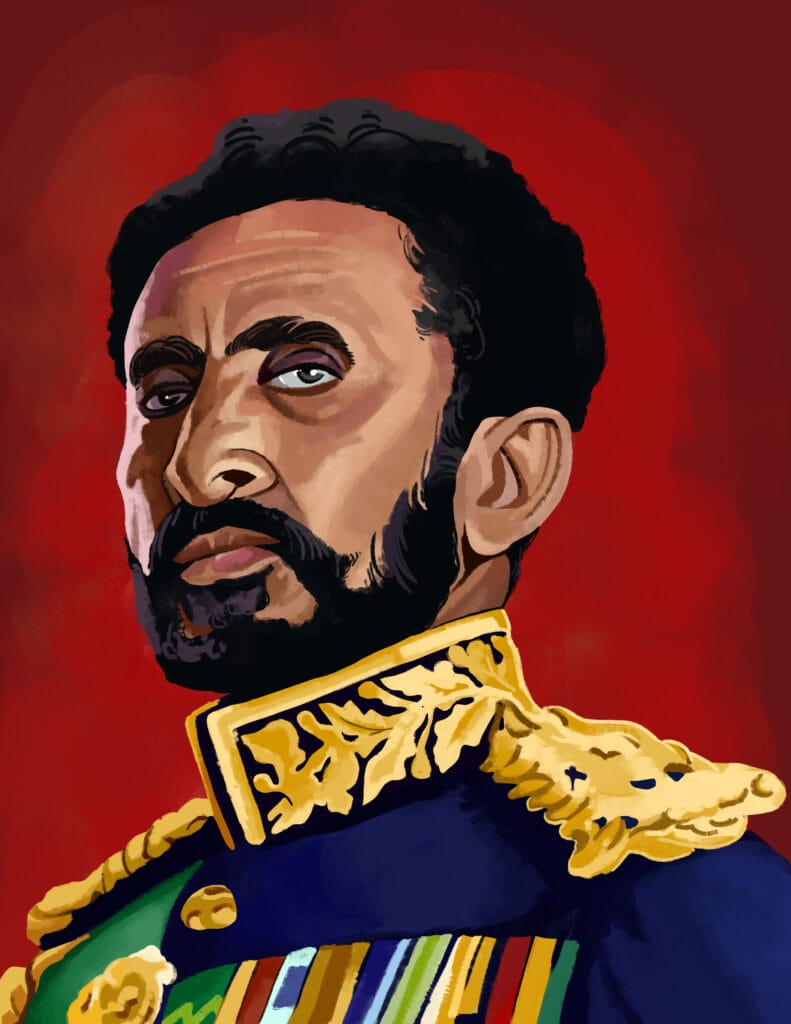
Impact of Rastafarianism
- Cultural Influence: Rastafarianism has had a profound impact on music, fashion, language, and lifestyle, most notably through the global spread of reggae music. Artists like Bob Marley have played a pivotal role in popularizing Rastafarian beliefs and aesthetics worldwide.
- Spiritual Movement: It has provided a spiritual and religious framework that resonates with people around the world, particularly those seeking alternative or Afrocentric spiritual paths. Its emphasis on one’s direct relationship with the divine and rejection of institutionalized religious practices is appealing to many.
- Political and Social Activism: The movement has been associated with political and social activism, especially in its critique of inequality, injustice, and oppression. It has inspired and supported movements for social change, both in Jamaica and internationally.
- Racial Pride and Identity: Rastafarianism has contributed significantly to discussions about race, identity, and the African diaspora’s connection to the African continent. It has helped to foster a sense of pride and unity among people of African descent.
- Controversies and Misunderstandings: Despite its positive impacts, Rastafarianism has faced controversy and misunderstanding, particularly regarding its use of marijuana and its unconventional beliefs. However, it has also prompted discussions on religious freedom, cultural expression, and the decriminalization of marijuana.
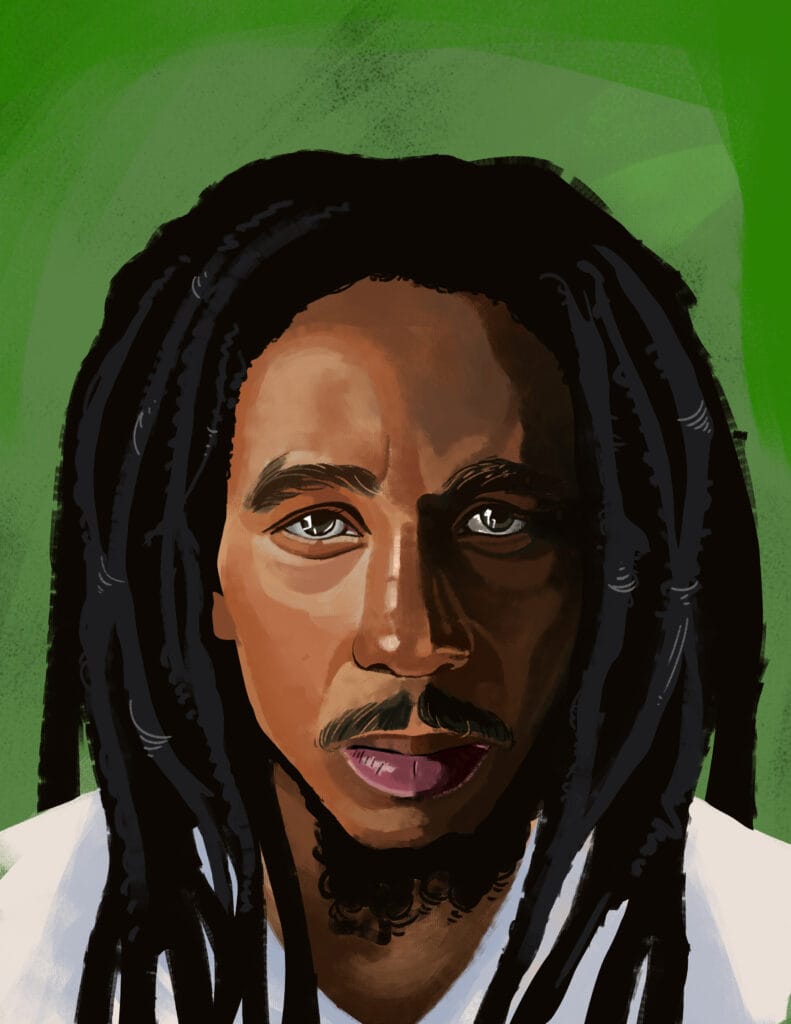
ROBERT NESTA MARLEY
1892-1975
Haile Selassie, born on July 23, 1892, near Harer, Ethiopia, and died on August 27, 1975, in Addis Ababa, was the emperor of Ethiopia from 1930 to 1974. He is remembered for his efforts to modernize Ethiopia and steer it into the mainstream of post-World War II African politics. During his reign, Ethiopia joined the League of Nations and the United Nations, and Addis Ababa became the major center for the Organization of African Unity (now African Union).
In addition to his political contributions, Haile Selassie is also a central figure in the Rastafarian movement, which regards him as a divine figure representing African redemption and Pan-Africanism. This belief stems from a speech by Marcus Garvey, a Jamaican-born activist and Pan-Africanist leader, who said, “Look to Africa, when a black king shall be crowned, for the day of deliverance is near.” Garvey’s statement was interpreted by some as referring to Haile Selassie’s coronation, leading to the belief in his divinity within the Rastafarian movement.
Rastafarianism remains a vibrant and influential movement, reflecting the complex interplay between religion, culture, politics, and identity. Its global impact underscores the interconnectedness of spiritual beliefs, social justice, and the power of cultural expression.


